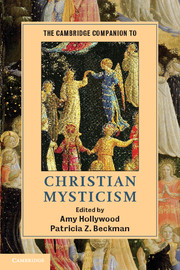Book contents
- Frontmatter
- Contents
- Contributors
- Introduction
- Part I Contexts
- Part II Key Terms
- Part III Contemporary Questions
- 13 Latin and the Vernaculars
- 14 Transmission
- 15 Writing
- 16 The Body and Its Senses
- 17 Mysticism and Visuality
- 18 Emotion
- 19 Authority
- 20 Gender
- 21 Sexuality
- 22 Time and Memory
- Select Bibliography of Christian Mystical Texts up to around 1750
- Select Bibliography of Modern Works Related to the Study of Western Christian Mysticism
- Author and Artist Index
- General Index
- References
16 - The Body and Its Senses
from Part III - Contemporary Questions
Published online by Cambridge University Press: 05 December 2012
- Frontmatter
- Contents
- Contributors
- Introduction
- Part I Contexts
- Part II Key Terms
- Part III Contemporary Questions
- 13 Latin and the Vernaculars
- 14 Transmission
- 15 Writing
- 16 The Body and Its Senses
- 17 Mysticism and Visuality
- 18 Emotion
- 19 Authority
- 20 Gender
- 21 Sexuality
- 22 Time and Memory
- Select Bibliography of Christian Mystical Texts up to around 1750
- Select Bibliography of Modern Works Related to the Study of Western Christian Mysticism
- Author and Artist Index
- General Index
- References
Summary
We cannot presume to know to what medieval mystical texts refer when they call attention to the body. In the Christian tradition, the body is not presented as a united whole but is divided into at least two parts, inner and outer, united only in an unknowable future. When medieval mystical texts write of the body, they require that we make sense of the body in its multifaceted nature. Within these texts, human beings are composed of both inner and outer bodies and inner and outer senses, a model that finds its paradigmatic expression in the writings of Origen (ca. 185–254) and Augustine (354–430). In the Confessions and On the Trinity, Augustine draws upon the anatomy of the outer body to provide an intellectual physiognomy for the soul and its forms of apprehension. For Augustine, just as the outer body has eyes, ears, and other sensory organs, the inner body, the sign of the interior human being, has inner ears and inner eyes, and memory, part of its most spiritually nutritive element, which functions like a stomach, distilling the inner from the outer, the eternal from the temporal, the “I” from the eternal “thou” who punctuates Augustine’s prose and his person. Impressions are distilled from the outside in. From the limited human perspective, a kind of sensing is converted into knowing or striving for the inner spiritual life.
Augustine does not invent the tradition; the notion of an inner human being is present in Hellenic thought and is linked to the soul and the afterlife. In Greek, it is often referred to as nous (mind) or psyche (the soul) and is tied to that part of creaturely existence that persists beyond physical death. In 2 Corinthians 4:16, the apostle Paul articulates this distinction between earthly and heavenly dwellings in terms of the difference between the “outer human being” (ho exo anthropos) and the “inner human being” (ho eso anthropos), the former characterized as a temporal earthly vessel that operates by means of things seen, and the latter as that aspect of the human being that renews itself according to the promised measure of eternal life.
- Type
- Chapter
- Information
- The Cambridge Companion to Christian Mysticism , pp. 264 - 276Publisher: Cambridge University PressPrint publication year: 2012
References
- 15
- Cited by



